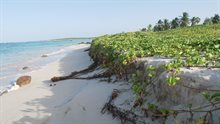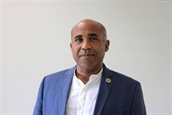Island Voices: interview with Antonio Carmona Baez from St. Martin
In the Caribbean part of the Kingdom, climate change is already being felt by people on the islands. It is getting warmer, periods of drought are increasing and when rain falls, much more falls in a shorter period of time. Moreover, hurricanes are becoming more powerful. How should the islands adapt to this? What is happening to prepare the islands and islanders for the future? In the series of interviews ‘Island Voices’, residents from different islands and with different areas of expertise talk about how they view climate change and adaptation.
This time, we interview Antonio Carmona Baez. He is President of the University of St. Martin (USM) and co-PI (principal investigator) of the NWO research programme ‘Island(er)s at the Helm’. He tells us why climate adaptation on St. Martin is important, what the challenges are for St. Martin and how he views the future of ‘the Friendly Island’.
Want to know more about climate adaptation in the Caribbean islands? On the knowledge portal you will now also find a section on the Caribbean part of our kingdom.
Why are you concerned with climate adaptation on St. Martin?
"It has been said that the Caribbean's annual greenhouse gas emissions are only 0.3 percent of what is emitted globally. Almost nothing, in other words. At the same time, the Caribbean is a very vulnerable place. Of all the countries within the Kingdom, we are most affected by the drastic impacts of climate change, such as more powerful hurricanes, longer periods of drought and downpours."."

What does this mean for St. Martin?
"The smaller an island, the better you can see how nature is treated. On St. Martin, we don't make a sharp distinction between climate adaptation and nature conservation. One goes hand in hand with the other. It's about general ecological concerns. Protecting nature automatically becomes climate adaptation. Because the impacts of climate change are so great on small islands, the consequences for biodiversity are immediately visible. We see it when our coasts become protected or more vulnerable. On a small island, you have little space for solutions to different challenges, for building shelters for vulnerable families or for waste management, which is a big concern. Space is limited."
Doesn't this apply to all Caribbean islands?
"It is important to understand that St. Martin’s situation is unique: there are two territories on one island. The southern part is a Dutch territory: “Country Sint Maarten”. The northern part is a French territory: the ‘Collectivité de Saint-Martin’. But state wise, there are major differences. In the French territory, residents have the same rights as in the rest of France. They have the same minimum wage, for example. That does not apply to us, as we do not have the same minimum wage as in the European part of The Netherlands. The French part is politically represented in Paris. We have no representation in the Dutch House of Representatives. The French territory is part of the European Union, the Dutch part of the island is not, even though our passport says it is. You have two different health systems, two different school systems. Even the plugs for the electric socket are different."
So there is a sharp border running between the two territories?
"Yes, but in practice it is invisible. If you blink your eyes, you miss the border. You go to school on one side, you work on the other. You have your home on one side, you go to the beach on the other. St. Martin's motto is ‘The Friendly Island’, with two territories running this island as friends. Only in times of crisis does the border become visible. After Hurricane Irma, there was a time when the borders were closed, supposedly to prevent looting in the French part. And during the COVID-19 pandemic, French President Macron shut down the border twice. This led to very uncomfortable situations, as residents have relatives on both sides of the border. Nobody lives on one side of the border."
What does this mean for climate adaptation?
"It leads to practical problems that stifle progress on the island. Look at coastal protection, for example. You have French coastal regulations and the two countries' own regulations on St. Martin. Moreover, the regulations of the Dutch part must be approved by the Dutch government. You also have the public entities of Saba and St Eustatius, which are very dependent on St. Martin in terms of logistics. But the Dutch government is now encouraging Saba and Sint Eustatius to make their own climate plans, as if they were separate from St. Martin. Then there is also nearby the British island of Anguilla, where many relatives of residents of St. Martin live! This thinking in borders is artificial. All these borders are an additional bump in the road to adapting together to the effects of climate change."
How do you see your own role in climate adaptation?
"As President of the University of St. Martin (USM) and a social scientist, I am committed to bringing scientific knowledge about the environment and social relations to the general population. I am also currently co-PI of the research programme ‘Island(er)s at the Helm’. This programme investigates sustainable and inclusive solutions to climate adaptation in the Caribbean, and also looks at housing, cultural aspects around climate change and policy, for example. One of the goals of ‘Island(er)s at the Helm’ is to bring the interests of islanders to the forefront and make sure they are aware of what is going on. We need experts, of course, from outside and within the region. But it is important that the local community is always involved in finding solutions to climate challenges. I am committed to that. In this, we also need to pay attention to vulnerable people who live in very precarious conditions."
Do vulnerable groups know too little about climate change?
"It is important to raise awareness about climate change among them. They know that temperatures are rising, but they often have more urgent things on their minds than asking why it is so hot or how long the heat will last. They just hope it cools down again eventually. It would be good if they too knew more about the causes. Then we on St. Martin can also think better about how to deal with these changes. We import over 80 percent of our food, which makes us vulnerable. How can we produce and consume in a different, more sustainable way? How can we live in a more sustainable way? Our legislators, our policy makers and our leaders need to set priorities in this regard."
What do you think is needed for that?
"We need a plan with a vision of how to change our lifestyle and the way we work. I think this can only be done by having a very inclusive dialogue, with all key sectors. So on St. Martin, we would also like to start risk dialogues soon, just like in the European Netherlands. However, not just with the Dutch islands, but with the entire Caribbean. Islands are too often thought to be isolated places. But that is not the case, in fact we are constantly moving amongst the islands. And we do depend on each other."
And what does St. Martin need from the Netherlands?
"We need a more equal, more inclusive and more equitable relationship between the Caribbean islands and the European Netherlands. I would like the Dutch government to make efforts to give Dutch citizens in the Caribbean everything they need to prepare for the effects of climate change. Not only on a material level, but also on a technical and financial level. Try to look at it from the perspective of human rights: the Dutch state has an obligation to protect its citizens in the Caribbean in the same way as in the European Netherlands. Here, it is also important that the Netherlands does not come and tell the islands exactly what should be done and how. Instead, make use of all the knowledge that exists on the islands. For example, how did they used to deal with crisis situations? Only when you understand the culture and history well can you come up with adequate solutions."
Final question: what would you like to pass on to future generations?
"What I would want for future generations is a more just and sustainable planet. One way to achieve this is by making scientific knowledge understandable to all and by making knowledge about our environment an essential part of our education. So that the residents of St. Martin are knowledgeable about the flora and fauna, both on the island and in the sea. That should be our legacy."

Antonio Carmona Baez